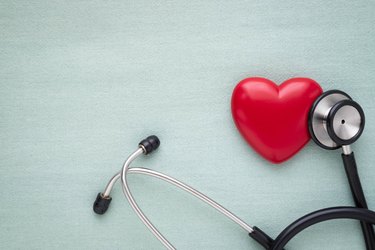
According to the American Heart Association (AHA), if you have high levels of triglycerides along with low levels of good cholesterol and high levels of bad cholesterol, you're at higher risk for heart disease and stroke. But what happens if you have high triglycerides with good cholesterol numbers?
"It is not uncommon to have high triglycerides with normal cholesterol — we see it all the time," says John P. Higgins, MD, a professor of medicine at McGovern Medical School at the University of Texas and chief of cardiology at Lyndon B. Johnson General Hospital in Houston. "Having just high triglycerides increases your risk for heart disease. It is a risk factor on its own, called an independent risk factor."
Video of the Day
Video of the Day
Read more: Triglycerides: What You Need to Know
Triglycerides vs. Cholesterol
As the AHA explains, there are two types of cholesterol. Low-density lipoprotein (LDL), known as the "bad" cholesterol, sets in motion the fatty buildup inside your arteries that can lead to the harmful endpoint of heart attacks and strokes. High-density lipoprotein (HDL) is the "good" cholesterol, which helps prevent those fatty deposits by removing bad cholesterol from inside your arteries and taking it to your liver — like a tow truck removing a car from the side of the road.
Your body makes cholesterol and you also get it from certain foods.
Triglycerides, on the other hand, are fats that your body makes from calories that you eat but don't use, especially calories from sugars, called carbohydrates, explains the Mayo Clinic. This fat is stored in your body's fat cells until you need calories for energy. It also increases your risk for heart disease, although that's a bit of a mystery. "We are not sure how triglycerides cause cardiovascular disease, but it may be from an effect they have on the inside lining of arteries," Dr. Higgins says.
According to Harvard Health Publishing, there's usually an inverse relationship between your good cholesterol and your triglycerides. Like a see-saw, as triglycerides go up, good cholesterol goes down, leaving all that extra LDL to hang out longer — further increasing your risk for heart disease and stroke. But, that's not always the case. You can have high levels of good cholesterol and still be in danger from high levels of triglycerides.
Understanding Your Risk
Dr. Higgins says some medical conditions and some medications increase your risk for high triglycerides even if you have healthy cholesterol numbers. These conditions include:
- Diabetes.
- Kidney disease.
- Obesity.
- Hypothyroid disease.
Medications can be a factor, too — including "birth control pills, estrogen hormones, the breast cancer drug tamoxifen, steroids, some diuretics and beta blocker drugs for high blood pressure," says Dr. Higgins.
High triglycerides increase your risk for metabolic syndrome, which also includes obesity, high blood pressure and high blood sugar, all at the same time, increasing further your risk for heart disease and stroke, explains Mayo Clinic. Harvard Medical School also notes that very high triglycerides increase your risk for pancreatitis, too.
What to Do
"Borderline numbers for triglycerides are around 150," Dr. Higgins says. "If your triglycerides are over 200, the number is too high." He says the best way to lower your triglycerides number is through exercise and diet, and suggests these steps:
- Work with your doctor to rule out any drugs or medical conditions that could be causing high triglycerides.
- Eat a diet lower in sugar, processed foods and saturated fats from meats and dairy.
- Avoid alcohol, especially beer and mixed drinks.
- Get some aerobic exercise on most days of the week.
- Lose weight if you are overweight.
- Don't smoke.
If lifestyle changes don't lower your triglycerides, Mayo Clinic says, your doctor may suggest a medication, such as:
- Statins. These drugs are used to treat high cholesterol and may help lower triglycerides.
- Fibrates. They're used to lower triglycerides, but you can't take them if you have kidney or liver disease.
- Omega-3 fatty acids. They can lower triglycerides and are most effective in prescription form rather than as an over-the-counter supplements
- Niacin. It lowers triglycerides as well as LDL cholesterol and is also more effective in prescription form.
"Statin medications are especially important for people with diabetes to lower triglycerides," Dr. Higgins adds. "Niacin is usually used in people with triglycerides over 500, who are at risk for pancreatitis."
"For most people," he says, "diet and exercise are the best treatment."
- American Heart Association: “HDL (Good), LDL (Bad) Cholesterol and Triglycerides”
- John P. Higgins, MD, MBA, MPHIL, professor of cardiovascular medicine, McGovern Medical School, University of Texas; chief of cardiology, Lyndon B. Johnson General Hospital, Houston
- Mayo Clinic: “Triglycerides: Why Do They Matter?”
- Harvard Health Publishing: “Should You Worry About High Triglycerides?”
Is this an emergency? If you are experiencing serious medical symptoms, please see the National Library of Medicine’s list of signs you need emergency medical attention or call 911.